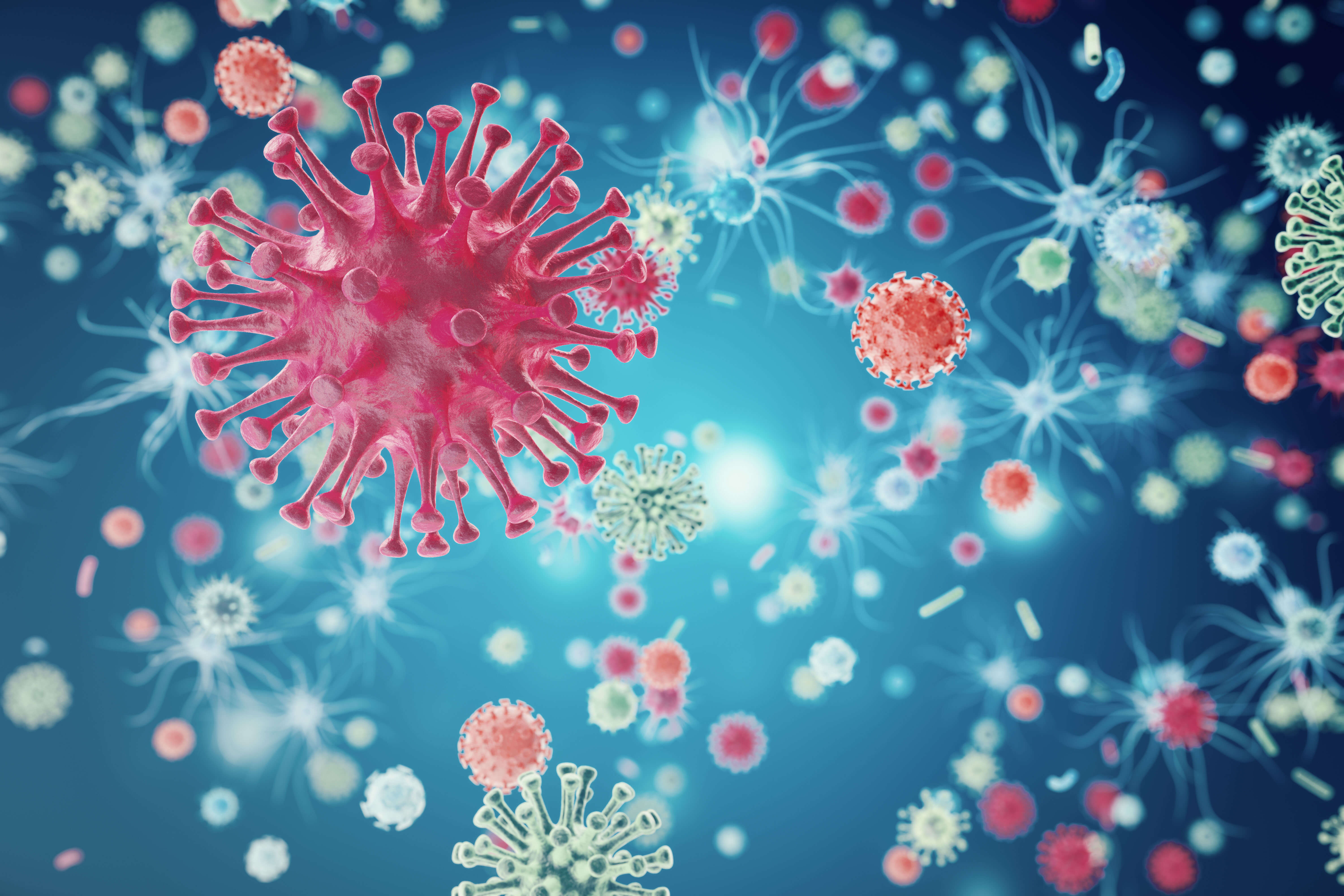
The Quantitative Biosciences Institute (QBI), QB3 and Gladstone Institutes present the 2019 QBI/Institut Pasteur Symposium on Infectious Disease. The meeting will address research and quantitative research focused on Infectious Disease.
Organized jointly by Drs. Christophe D’Enfert and Nevan Krogan the inaugural QBI/Pasteur Institute Symposium on Infectious Disease will be held in San Francisco on March 18-19, 2019. This symposium is affiliated with the recently formed Host-Pathogen Map Initiative (HPMI), a collaborative effort between QBI/UCSF and UC Berkeley.
QBI seeks transformative results in biomedicine by supporting fundamental quantitative research in the biological sciences. The Institut Pasteur strives to increase its global health impact through strengthening of fundamental biomedical research activities and their translation into biomedical innovations and technologies. The Quantitative Biology program of the Institut Pasteur intends to facilitate research innovation at the interface of infectious biology and quantitative sciences. The HPMI, which was jointly formed by QBI and CEND (Center for Emerging and Neglected Disease) at UC Berkeley, aims to systematically study the host-pathogen interface.
In support of these missions, the symposium will focus on using innovative and quantitative approaches to study the host-pathogen interface.
Monday, March 18, 2019
9:00 – 9:25: Nevan Krogan, Katie Pollard and Christophe d’Enfert - Welcome and introduction
Session 1
9:25 – 9:50: Nevan Krogan, Quantitative Bioscience Institute, UCSF, and Gladstone Institutes – “The Host-Pathogen Map Initiative – from Systems to Structure to Mechanism”
9:50 – 10:20: Mélanie Hamon, Institut Pasteur, Paris, France – “Epigenetic modifications induced by bacteria-host interactions”
10:20 – 10:50: Coffee Break
Session 2 – Chair: Mélanie Hamon
10:50 – 11:20: Michael Nilges, Institut Pasteur, Paris, France – “New methods for computational drug discovery”
11: 20 – 11:45: Melanie Ott, Gladstone Institutes and UCSF – “Using Organoid Technology to Study Human Pathogenic Viruses “
11:45 – 12:15: Olivier Schwartz, Institut Pasteur, Paris, France – “Restriction factors, antibodies and complement: a concerted antiviral immune effort”
12:15 – 1:15: Lunch
Session 3 – Chair: Oren Rosenberg
1:15 – 1:45: Félix Rey, Institut Pasteur, Paris, France – “Viral fusion proteins as targets in the search for antiviral compounds “
1:45 – 2:10: Shaeri Mukherjee, Quantitative Bioscience Institute -UCSF – “Turning pathogens into Cell-Biology tools “
2:10 – 2:40: Greg Barton, University of California, Berkeley – “New mechanisms control self versus non-self discrimination by Toll-like receptors”
2:40 – 3:10: Julia Chamot-Rooke, Institut Pasteur, Paris, France – “Emerging structural proteomics strategies to tackle human infectious diseases”
3:10 – 3:40: Coffee Break – Meet Pasteur Speakers
Session 4 – Chair: Sven van Teeffelen
3:40 – 4:10: Sarah Stanley, University of California, Berkeley, USA – “Metabolic regulation of the Mtb host-pathogen interaction”
4:10 – 4:40: Gerald Spaeth, Institut Pasteur, Paris, France – “Novel insight into Leishmania environmental adaptation using quantitative systems analyses”
4:40 – 5:10: Matthew Albert, Genentech – “Systems approach to defining the impact of chronic infection on induced immune response variation (insights from the Milieu Interieur Consortium)“
5:10 – 5:40: Skip Virgin, Vir Biotechnology, San Francisco, USA – “Role of autophagy genes in inflammation and infection”
**********************************************************************************
Tuesday, March 19, 2019
Session 5 – Chair: Shaeri Mukherjee
9:00 – 9:30: Christophe d’Enfert, Institut Pasteur, Paris, France – “The Candida albicans ORFeome: a resource for systematic investigation of gene function in a fungal pathogen of humans“
9:30 – 9:55: John Gross, Quantitative Bioscience Institute and University of California, San Francisco – “Amino acid changes in primate lentiviral Vif underlying the emergence of SIVcpz”
9:55 – 10:25: Christophe Zimmer, Institut Pasteur, Paris, France – “Computational imaging and modeling approaches for cell biology and pathology”
10:25 – 10:55: Coffee Break
Session 6 – Chair: Carmen Buchrieser
10:55 – 11:25: Sven van Teeffelen, Institut Pasteur, Paris, France – “Cell-envelope homeostasis in bacteria – from single enzymes to macroscopic shape and physical integrity”
11:25 – 11:50: Oren Rosenberg, Quantitative Bioscience Institute and UCSF – “Native structure of a key virulence determinant from mycobacteria”
11:50 – 12:20: Guillaume Duménil, Institut Pasteur, Paris – “How bacterial pathogens exploit physical properties of matter: the example of Neisseria meningitis”
12:20 – 1:20: Lunch
Session 7 – Chair: Sarah Stanley
1:20 – 1:45: Andrej Sali, Quantitative Bioscience Institute and UCSF – “Integrative Structural Biology”
1:45 – 2:15: Carmen Buchrieser, Institut Pasteur, Paris – “Quantitative image analyses to decipher Legionella -host interactions”
2:15 – 2:40: Dan Portnoy, University of California, Berkeley, USA – “How intracellular pathogens sense the host cell environment and the serendipitous discovery that Listeria monocytogenes is electrogenic”
2:40 – 3:20: Coffee Break – Meet Pasteur Speakers
Session 8 – Chair: Julia Chamot-Rooke
3:20 – 3:50: Andrew Emili, Boston University, Boston, USA – “Mind the Gap: Mapping the Microbial Proteome-Metabolome Interface for Drug Discovery”
3:50 – 4:15: Jeff Cox, University of California, Berkeley, USA – “Using Global Proteomics to Discover New Anti-TB Pathways of Macrophages”
4:15 – 4:25: Liliana Brown, Program Officer, Office of Genomics and Advanced Technologies | Division of Microbiology and Infectious Diseases/NIAID/NIH/DHHS, Rockville, USA – “The NIAID Systems Biology Consortium for Infectious Diseases”
4:25 – 4:35: Jeff Cox, University of California, Berkeley, USA – Closing Remarks
4:45 – 6:30: Poster Session & Reception -

Subscribe to our calendar and stay updated on the latest events.
Share event to your friends by email.